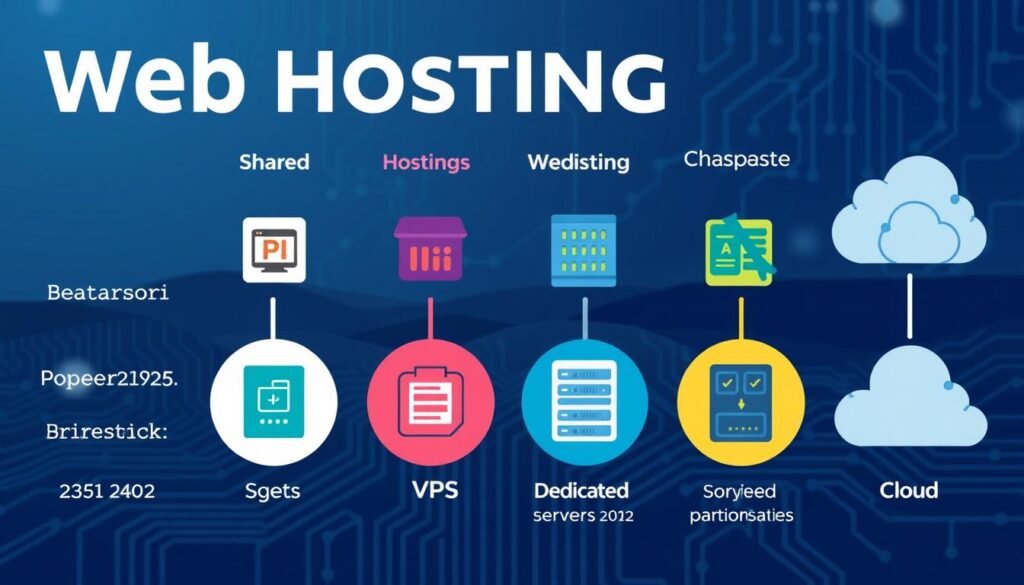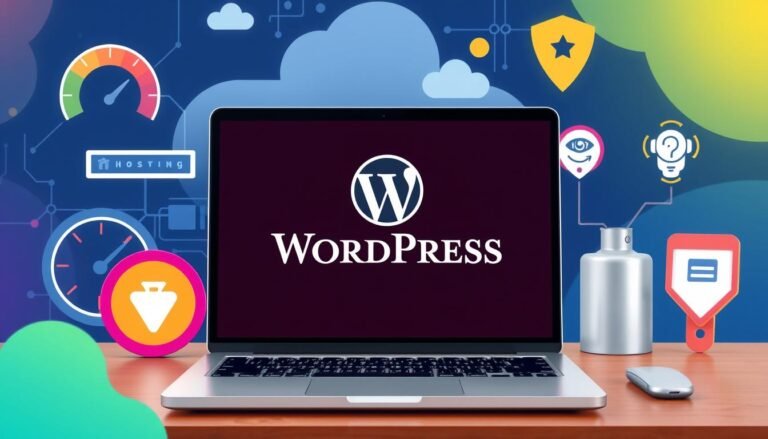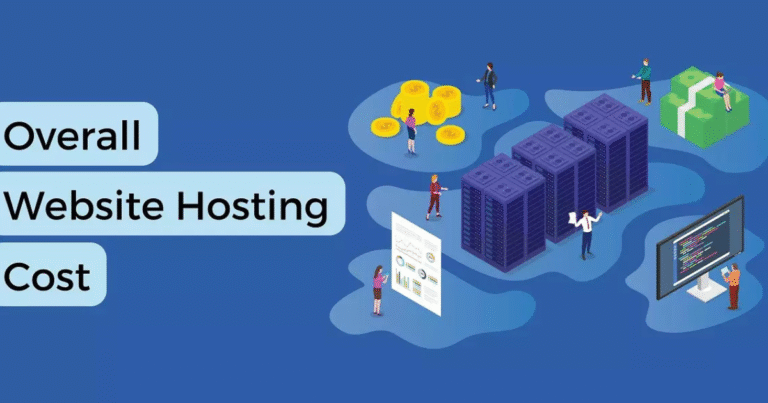How To Choose Web Hosting For Small Businesses?
For small businesses, having a strong online presence is key. Web Hosting For Small Businesses is the base that supports this presence. Choosing the right web hosting provider is vital for your website’s success. It ensures your site is accessible, secure, and runs smoothly.
If you’re starting out or already running a small business, finding the right web hosting can seem tough. But, knowing what to look for can help. Understanding the basics of web hosting and what features matter most can guide your choice. This way, you can pick a hosting service that fits your business needs perfectly.
Key Takeaways
- Web hosting is essential for small businesses to establish an online presence and make their website accessible to visitors.
- Factors to consider when choosing a web hosting provider include hosting needs, package selection, security features, and customer support.
- Popular web hosting options for small businesses include HostGator, DreamHost, InMotion Hosting, and A2 Hosting.
- Security and performance are crucial aspects when selecting a web hosting provider, especially for small businesses without dedicated IT teams.
- Understanding the difference between initial promotional pricing and renewal rates is important in budgeting for web hosting services.
Understanding Web Hosting Fundamentals
Having an online presence is key for small businesses today. Web hosting is at the core of a successful website. It makes your site accessible on the internet. Knowing the basics of web hosting helps you pick the right hosting for your business.
What Makes Web Hosting Essential for Business
Web hosting is vital for businesses for many reasons:
- It lets you create a professional website that shows who you are online.
- It makes sure your site is easy to find, helping to attract more visitors and leads.
- It keeps your site safe and reliable, giving users a smooth experience.
- It offers tools like email accounts and website builders to make managing your site easier.
Different Types of Web Hosting Services
There are many web hosting services to choose from, each with its own benefits:
- Shared Hosting: A budget-friendly option for small sites and blogs. It’s great for beginners.
- Virtual Private Server (VPS) Hosting: Good for medium-sized sites and blogs growing fast. It needs technical skills and can be more expensive.
- Cloud Hosting: Offers reliability and scalability. It’s best for businesses with many sites and large operations.
- Dedicated Hosting: Gives you a whole server for your site. It’s reliable but expensive, best for big businesses.
Common Web Hosting Features
When picking a hosting provider, consider these key features:
- Storage space: The disk space for your site’s files and content.
- Bandwidth: The data transfer limit, affecting your site’s traffic handling.
- Email accounts: The number of email accounts you can have, for professional communication.
- Domain management: The ability to manage your site’s domain name.
- Security features: SSL certificates, firewalls, and backups to protect your site.
- Site builders and content management systems: Tools to make creating and updating your site easier.
Understanding web hosting basics is the first step in finding the right hosting for your small business. By matching your needs with the right hosting plan, you can have a strong online presence and a great user experience.
Key Features to Look for in Small Business Web Hosting

Choosing the right web hosting for your small business is important. You need reliable hosting features for a stable, fast, and secure website. These are key for success online today.
First, focus on website performance. Look for hosts with enough bandwidth and storage for your site. Also, aim for high uptime to keep your site always available.
- Sufficient storage and bandwidth to accommodate your website’s needs
- Consistent, high-uptime reliability to maintain an always-on online presence
- Scalability options to support your business as it grows
Security is also vital. Your web host should offer strong security like SSL certificates, firewalls, and regular scans. This keeps your site and customer data safe.
| Feature | Importance | Example Providers |
|---|---|---|
| SSL Certificates | Crucial for secure online transactions and customer trust | Let’s Encrypt, Comodo, DigiCert |
| Firewalls | Safeguard against cyber threats and malicious attacks | Cloudflare, Sucuri, Wordfence |
| Malware Scanning | Protect your website and customers from harmful infections | SiteLock, Sucuri, Wordfence |
Think about the user experience and tools your host offers. Look for easy CMS installations, simple control panels, and good customer support. These make managing your site easy and stress-free.
By focusing on these key features, you can find a web host that supports your business’s growth and success.
Web Hosting For Small Businesses: Popular Options

Small businesses have many web hosting choices. From affordable shared hosting to flexible cloud hosting, each has its own benefits. They meet the different needs of small businesses.
Shared Hosting Solutions
Shared hosting is great for small businesses with some website traffic. Bluehost and SiteGround offer reliable shared hosting. They provide shared hosting, email hosting, and basic website tools.
While shared hosting works well for many, it can slow down during busy times. Still, it’s a good start for small businesses online.
VPS Hosting Benefits
VPS hosting is a good choice for businesses growing out of shared hosting. HostWinds and Liquid Web offer VPS hosting with dedicated resources. This means better performance and more control over your server.
This is especially helpful for businesses with growing online needs or specific app needs.
Cloud Hosting Advantages
Cloud hosting from DreamHost and DigitalOcean is scalable and reliable. It uses many servers to ensure high availability and flexibility. This is perfect for businesses with changing needs.
Each hosting type has its own strengths and weaknesses. Small businesses should think about their needs and budget. This will help choose the best hosting solution.
| Hosting Type | Pros | Cons |
|---|---|---|
| Shared Hosting |
|
|
| VPS Hosting |
|
|
| Cloud Hosting |
|
|
“Choosing the right web hosting solution is crucial for the success and growth of a small business. Each option offers unique benefits, and thorough research is essential to make an informed decision.”
Security and Performance Considerations

When picking a web hosting for your small business, security and performance are key. Good website security keeps your online presence safe and protects customer data. Look for hosting that offers SSL certificates, regular backups, and malware protection.
Performance is also crucial. It affects your website’s user experience and search rankings. Check hosts for server speed, uptime guarantees, and CDN support. Aim for at least a 99.9% uptime guarantee to keep your site up and running.
- Look for SSL certificates to encrypt data transmission and enhance website security
- Ensure regular backups and malware scanning to protect against data loss and cyber threats
- Prioritize hosts with fast server response times and robust CDN support for optimal performance
- Choose providers that guarantee at least 99.9% uptime to maintain consistent website availability
Focus on security and performance when choosing a web host. This builds a solid online base for your business. It helps you earn customer trust and provides a smooth user experience.
Also Read: Domain Hosting vs Web Hosting: What Are the Costs Involved?
Cost Analysis and Budget Planning
Choosing a web hosting provider for your small business requires careful cost analysis and budget planning. Initial prices might look good, but renewal rates can be much higher. It’s key to consider these rates when planning your budget.
Initial Pricing vs. Renewal Rates
Many providers offer low prices to draw in new customers. But, renewal rates can be two to three times higher. This can greatly affect your long-term costs. Always check renewal rates when looking at hosting options.
Hidden Costs to Consider
There are often hidden costs beyond the base hosting fee. These can include domain fees, SSL certificate charges, and backup service costs. Make sure to research and understand all costs before choosing a plan.
Value-Added Features Worth Paying For
While keeping costs down is important, some features are worth the extra money. These might include managed services, advanced security, and premium support. Weigh the benefits of these features against the costs to find the best value for your business.
FAQs
Q: What should I consider when selecting a web host for my small business?
A: When choosing a web host for your small business, consider factors such as reliability, speed, customer support, pricing, and the type of hosting service offered (shared, VPS, dedicated, or cloud hosting). It’s also essential to evaluate the hosting provider’s track record with small business hosting and their features like free SSL certificates and domain registration.
Q: What is the best web hosting option for small businesses?
A: The best web hosting option for small businesses typically includes shared hosting for budget-friendly solutions, VPS hosting for more control and resources, and managed WordPress hosting for those using WordPress. Each option has its pros and cons depending on the specific needs of the business.
Q: How can I choose the best web hosting services for my small business website?
A: To choose the best web hosting services for your small business website, identify your business needs, compare different hosting providers, read customer reviews, and assess their customer service. Look for features like uptime guarantees, scalability, and specific offerings for small businesses.
Q: What is shared hosting, and is it suitable for small businesses?
A: Shared hosting is when multiple websites share the same server resources. It can be a cost-effective solution for small businesses with limited traffic, but it may not provide the performance needed for larger sites. Evaluate your business’s growth potential before choosing a shared hosting plan.
Q: What are the advantages of cloud hosting for small businesses?
A: Cloud hosting offers scalability, flexibility, and reliability, as resources can be adjusted based on demand. This is beneficial for small businesses that experience fluctuating traffic or need to scale quickly. Additionally, cloud hosting often provides enhanced security and data backup options.
Q: Do I need a free domain when selecting a web hosting service for my small business?
A: A free domain can be a great benefit offered by many web hosting providers, especially for small business owners looking to save on initial costs. However, ensure that the domain you receive is suitable for your business branding and easy for customers to remember.
Q: How important is customer support when choosing a hosting provider for small businesses?
A: Customer support is crucial when selecting a hosting provider for small businesses. Reliable customer service can help resolve issues quickly and minimize downtime, which is essential for maintaining your business’s online presence. Look for providers that offer 24/7 support.
Q: What is managed WordPress hosting, and is it right for small business websites?
A: Managed WordPress hosting is a specialized hosting service that takes care of WordPress-specific needs, such as updates, security, and backups. It is ideal for small business websites that run on WordPress, as it simplifies management and ensures optimal performance and security.
Q: Can I migrate my existing website to a new hosting provider?
A: Yes, you can migrate your existing website to a new hosting provider. Most reputable hosting services for small businesses offer migration assistance or tools to help transfer your site smoothly. Ensure that the new web hosting provider can accommodate your current traffic and hosting needs.
Source Links
- https://blog.hubspot.com/website/best-web-hosting-for-small-business
- https://www.pcmag.com/picks/the-best-small-business-web-hosting-services
- https://www.hostinger.com/tutorials/what-is-web-hosting/
- https://www.jezweb.com.au/understanding-the-fundamentals-of-website-hosting/
- https://www.business.com/articles/10-tips-for-choosing-the-right-web-hosting-company/
- https://www.iwantclarity.com/best-web-hosting-for-small-business/
- https://diggitymarketing.com/web-hosting/features/
- https://www.digitalocean.com/solutions/small-business-website-hosting
- https://enterprisewired.com/7-best-web-hosting-for-small-businesses/
- https://berkaweb.com/a-guide-to-web-hosting-for-small-business-owners/
- https://blog.powr.io/10-tips-for-choosing-small-business-web-hosting-in-2024
- https://aqmarketing.com/website-hosting-for-small-business/
- https://www.ryrob.com/how-much-does-web-hosting-cost/
- https://www.webfx.com/blog/web-design/how-much-does-it-cost-to-build-a-website-for-a-small-business/







